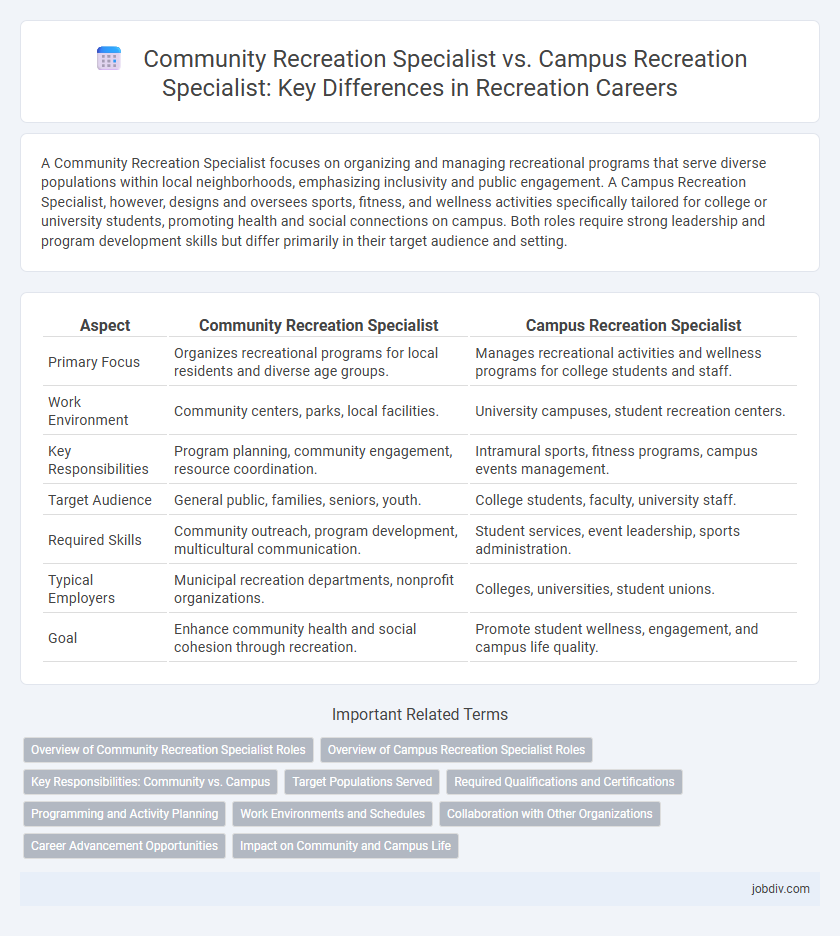A Community Recreation Specialist focuses on organizing and managing recreational programs that serve diverse populations within local neighborhoods, emphasizing inclusivity and public engagement. A Campus Recreation Specialist, however, designs and oversees sports, fitness, and wellness activities specifically tailored for college or university students, promoting health and social connections on campus. Both roles require strong leadership and program development skills but differ primarily in their target audience and setting.
Table of Comparison
| Aspect | Community Recreation Specialist | Campus Recreation Specialist |
|---|---|---|
| Primary Focus | Organizes recreational programs for local residents and diverse age groups. | Manages recreational activities and wellness programs for college students and staff. |
| Work Environment | Community centers, parks, local facilities. | University campuses, student recreation centers. |
| Key Responsibilities | Program planning, community engagement, resource coordination. | Intramural sports, fitness programs, campus events management. |
| Target Audience | General public, families, seniors, youth. | College students, faculty, university staff. |
| Required Skills | Community outreach, program development, multicultural communication. | Student services, event leadership, sports administration. |
| Typical Employers | Municipal recreation departments, nonprofit organizations. | Colleges, universities, student unions. |
| Goal | Enhance community health and social cohesion through recreation. | Promote student wellness, engagement, and campus life quality. |
Overview of Community Recreation Specialist Roles
Community Recreation Specialists design and implement programs that promote health, wellness, and social engagement for diverse community populations across parks, senior centers, and local facilities. They manage resources, coordinate events, and collaborate with local organizations to address the recreational needs of all age groups while emphasizing inclusivity and accessibility. Their role often involves assessing community interests, securing funding, and ensuring compliance with safety and regulatory standards to enhance overall quality of life.
Overview of Campus Recreation Specialist Roles
Campus Recreation Specialists manage and develop recreational programs, facilities, and services specifically tailored to university or college campuses, focusing on enhancing student engagement, wellness, and campus life. Their responsibilities often include coordinating intramural sports, fitness classes, and special events while ensuring facility safety and accessibility. These specialists collaborate with student organizations and campus departments to create inclusive, diverse recreational opportunities that promote healthy lifestyles and community building within the academic environment.
Key Responsibilities: Community vs. Campus
Community Recreation Specialists manage diverse programs that engage local residents, overseeing public parks, senior activities, and youth sports leagues to promote wellness and social interaction. Campus Recreation Specialists focus on developing and supervising fitness, intramural sports, and wellness programs tailored for students and staff within university environments. Both roles require coordinating events, managing facilities, and ensuring safety, but community specialists emphasize broad public outreach while campus specialists prioritize collegiate engagement and student development.
Target Populations Served
Community Recreation Specialists primarily serve diverse local populations, including families, seniors, and individuals with disabilities, by designing inclusive programs that promote social engagement and wellness. Campus Recreation Specialists focus on university students, faculty, and staff, offering tailored activities that support academic life, physical fitness, and student development. Both roles address unique needs through targeted outreach, but Community Recreation emphasizes broader public access while Campus Recreation prioritizes educational environments.
Required Qualifications and Certifications
Community Recreation Specialists typically require a bachelor's degree in recreation, leisure studies, or a related field, along with certifications such as CPR, First Aid, and Certified Park and Recreation Professional (CPRP). Campus Recreation Specialists often need similar educational qualifications but may also require experience or certifications related to higher education settings, such as risk management or student leadership development credentials. Both roles demand strong interpersonal skills and a commitment to promoting inclusive recreational programs.
Programming and Activity Planning
Community Recreation Specialists develop diverse programs tailored to the broader public, emphasizing inclusivity and accessibility for all age groups in parks, community centers, and local events. Campus Recreation Specialists design activities specifically for college students, focusing on wellness, intramural sports, and student engagement initiatives within university facilities. Both roles require expertise in scheduling, resource allocation, and participant assessment to ensure effective and appealing recreational programming.
Work Environments and Schedules
Community Recreation Specialists typically work in public parks, community centers, and local government facilities, with schedules that often include evenings and weekends to accommodate public participation. Campus Recreation Specialists operate within university or college settings, managing fitness and wellness programs with hours aligned to academic calendars, often including evenings but fewer weekend shifts. Both roles require flexibility, but campus specialists may have more predictable hours tied to semester schedules, while community specialists adapt to broader public availability.
Collaboration with Other Organizations
Community Recreation Specialists collaborate extensively with local governments, nonprofits, and health organizations to create inclusive programs that address diverse community needs. Campus Recreation Specialists work closely with university departments, student groups, and external sports leagues to develop activities that enhance student engagement and well-being. Both roles require strategic partnerships to optimize resources and expand recreational opportunities.
Career Advancement Opportunities
Community Recreation Specialists often have broader career advancement opportunities within public parks, municipal programs, and nonprofit organizations, emphasizing diverse population engagement and program development. Campus Recreation Specialists typically advance by taking on leadership roles in higher education institutions, specializing in student wellness, facility management, and event coordination tailored to collegiate environments. Both pathways offer growth through certifications, leadership training, and specialization in recreation therapy or sports management.
Impact on Community and Campus Life
Community Recreation Specialists enhance public engagement by organizing inclusive activities that promote health, social interaction, and cultural awareness across diverse populations; their work fosters stronger neighborhood connections and improves overall quality of life. Campus Recreation Specialists concentrate on developing programs and facilities that support student wellness, leadership, and academic success, creating a vibrant and active campus environment. Both roles significantly impact their respective populations by encouraging physical activity, mental well-being, and community cohesion through tailored recreational initiatives.
Community Recreation Specialist vs Campus Recreation Specialist Infographic

 jobdiv.com
jobdiv.com